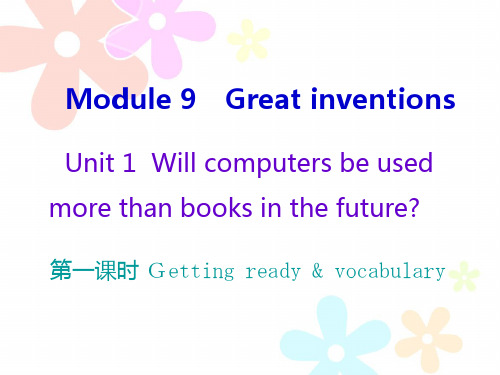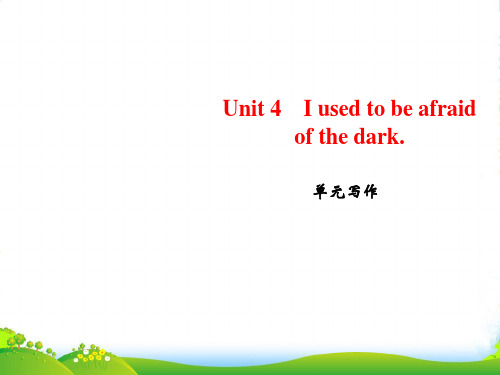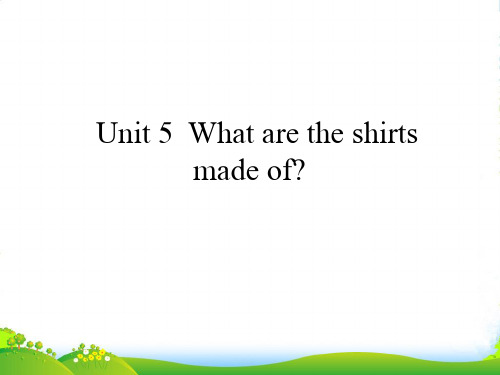unit修改的课件九年级英语李老师。-PPT
合集下载
人教版九年级英语全册unit1PPT课件新目标-人教新目标版九年级全册

发音
记忆 背诵
不同地, 有区别地 使失望,使沮丧 快地,迅速地 激动的,兴奋的 慢地,缓慢地 错误;过失 解决;解答
realize v. afraid adj. impress v. trouble n. deal v. unless conj. solve v. regard v. affect v. friendship n. disagreement n
by watching TV
by practicing with a foreigner
by watching the English movies
by reading the textbook
Ways of leaning English
by working with friends
by getting an English tutor(家教)
basketball players in the world.
A. regarded B. made C. kept D. watched
2. You’ll fail your next exam ___B___you work hard at your
studies now.
A. because B. unless C. so D. why
认识到,了解到 怕的,害怕的 使感动;给……深刻印象 困难;苦恼 处理,应付 如果不;除非 解决;解答 将……看作 影响;对……起作用 友谊;友情 分歧;不一致
friendship
1. We hope the ___ (友谊) between our countries will last long.
以…开始 使发音正确 首先 做…有麻烦 决定干某事 编对话 把……当作…… 与……比较
新人教版九年级英语 unit4 period4-优质课件.ppt

3. get/become used to sth./doing sth. 意为“逐渐习惯于……”,强调这一习 惯的过程,to是介词。
4. be used to do 意为“被用来做……”,被动语态结构, to后跟动词原形。
5. be used for doing sth. 意为“被用来……”,介词for表示功能、 用途。
school. 5. 我不习惯午饭吃这么多。
I’m __n__o_t__ used to _e_a_t_i_n_g___ so much
at lunch time.
4a Write sentences about the past using used to.
1. Grace/watch a lot of TV/watch a lot of movies G__ra_c_e__u_s_e_d__to__w_a_t_c_h_a__lo__t _o_f_T_V_._S_h_e__d_id_n_’t u_s_e__t_o_w__a_tc_h__a_l_o_t_o_f_m__o_v_ie_s_.___________
(四) used to 的状语可以用副词always, often,sometimes等,但是仍然是过去的 习惯,不是指现在的习惯,所以不能用 一般现在时。
例如:He always used to be late for class. 他过去常常上课迟到。
(五) used to可以用在there be结构中表示 “过去经常有”的意思。 There used to be
Did he use to wear glasses? used to do sth. 表示过去习惯性的动作或存在的状态。 to后跟动词原形,只用于一般过去时态。
4. be used to do 意为“被用来做……”,被动语态结构, to后跟动词原形。
5. be used for doing sth. 意为“被用来……”,介词for表示功能、 用途。
school. 5. 我不习惯午饭吃这么多。
I’m __n__o_t__ used to _e_a_t_i_n_g___ so much
at lunch time.
4a Write sentences about the past using used to.
1. Grace/watch a lot of TV/watch a lot of movies G__ra_c_e__u_s_e_d__to__w_a_t_c_h_a__lo__t _o_f_T_V_._S_h_e__d_id_n_’t u_s_e__t_o_w__a_tc_h__a_l_o_t_o_f_m__o_v_ie_s_.___________
(四) used to 的状语可以用副词always, often,sometimes等,但是仍然是过去的 习惯,不是指现在的习惯,所以不能用 一般现在时。
例如:He always used to be late for class. 他过去常常上课迟到。
(五) used to可以用在there be结构中表示 “过去经常有”的意思。 There used to be
Did he use to wear glasses? used to do sth. 表示过去习惯性的动作或存在的状态。 to后跟动词原形,只用于一般过去时态。
人教版九年级上学期英语课件: Unit3(共23张PPT)

九年级上册——英语 听课手册
九年级上册Unit 3
Section A 高频考点精讲 1.The bookstore is on your right, beside the bank. 书店 在你的右边,银行旁边。 (1)辨析beside, besides与except beside prep “在……旁边”。如: You can sit beside me. 你可以坐我旁边。
九年级上册Unit 3
besides “除……之外(包含在内)”。如: There are another three students besides me. 除 我之外还有其他的三个学生。 except prep. “除了……之外(不包括在内)”。 如: I like all kinds of fruit except apples. 除了苹果,所 有的水果我都喜欢。 (2)辨析by, beside, near, next to与close to 上。
九年级上册Unit 3
①by和beside均表示“在……旁边”,常可互换。 如: Come and sit beside/by me. 过来,坐在我边 ②near表示“在……附近”,表示的距离比by和 beside稍远些。如: Don’t play near the road. 不要在马路附近玩耍。 There is a post office near the bank. 银行附近有一 所邮局。
解析:本题考查现在完成时态。从句中for almost 3 years 可知,横线处的谓语动词需要用延续性动词或表 某种状态存在的词,且时态采用现在完成时。
九年级上册Unit 3
3.You don’t need to rush! 不用急! need的用法 need后加to do 说明need为实义动词,用助动词提问 或否定;need后加doing表被动意义;若need后加 do,则need为情态动词,用need提问,肯定回答用 must,否定回答用needn’t。如:
九年级上册Unit 3
Section A 高频考点精讲 1.The bookstore is on your right, beside the bank. 书店 在你的右边,银行旁边。 (1)辨析beside, besides与except beside prep “在……旁边”。如: You can sit beside me. 你可以坐我旁边。
九年级上册Unit 3
besides “除……之外(包含在内)”。如: There are another three students besides me. 除 我之外还有其他的三个学生。 except prep. “除了……之外(不包括在内)”。 如: I like all kinds of fruit except apples. 除了苹果,所 有的水果我都喜欢。 (2)辨析by, beside, near, next to与close to 上。
九年级上册Unit 3
①by和beside均表示“在……旁边”,常可互换。 如: Come and sit beside/by me. 过来,坐在我边 ②near表示“在……附近”,表示的距离比by和 beside稍远些。如: Don’t play near the road. 不要在马路附近玩耍。 There is a post office near the bank. 银行附近有一 所邮局。
解析:本题考查现在完成时态。从句中for almost 3 years 可知,横线处的谓语动词需要用延续性动词或表 某种状态存在的词,且时态采用现在完成时。
九年级上册Unit 3
3.You don’t need to rush! 不用急! need的用法 need后加to do 说明need为实义动词,用助动词提问 或否定;need后加doing表被动意义;若need后加 do,则need为情态动词,用need提问,肯定回答用 must,否定回答用needn’t。如:
外研版九年级英语上册课件:Module 9 Unit 1 (共31张PPT)

二、根据汉语意思补全下列句子,每空一词 1. 昨天他把布告张贴在墙上了。 He __p_u_t__ __u_p__ the notice on the wall yesterday. 2.他可以用这么一大笔钱去帮助成千上万的孩子。 He could help __t_h_o_u_s_a_n_d_s__ ___o_f_ children with such a large amount of money. 3.我很久没有收到我叔叔的来信了。 I haven't __h_e_a_r_d__ __f_r_o_m___ my uncle for a long time.
我对他的谈话做了几页笔记。 Please turn to Page Ten. 请翻到第10页。
应用
( B )Please turn to Page ______ and read the
_______ story.
A.Ten; two
B. Ten; second
C.Tenth; second
D. Tenth; two
爸爸,我能借用你的相机吗? 它们(照片)将被公布在学校的网站上。
其他班的同学,甚至生活在其他国家的人 也能在因特网上看到它们。
一些书很厚,有上千页。
•9、要学生做的事,教职员躬亲共做;要学生学的知识,教职员躬亲共学;要学生守的规则,教职员躬亲共守。2021/9/82021/9/8Wednesday, September 08, 2021 •10、阅读一切好书如同和过去最杰出的人谈话。2021/9/82021/9/82021/9/89/8/2021 1:49:15 PM •11、只有让学生不把全部时间都用在学习上,而留下许多自由支配的时间,他才能顺利地学习……(这)是教育过程的逻辑。2021/9/82021/9/82021/9/8Sep-218-Sep-21 •12、要记住,你不仅是教课的教师,也是学生的教育者,生活的导师和道德的引路人。2021/9/82021/9/82021/9/8Wednesday, September 08, 2021
人教版九年级上册英语授课课件Unit 4 Section A (1a-2d)

n’t it? Bob: And it’s straight! Tina: Yeah, it used to be curly.
课文呈现
1c. Lookatthepicturein1aandmakeconversations. A:DidMariousetobeshort? B:Yes, hedid. Heusedtobereallyshort. A:What’shelikenow? ② B:He’stallnow.
Steve: Wow, you’re so active! People sure change.
课文呈现
2c. MakeconversationsaboutPaulausingtheinformationin2b. A:Paulausedtobereallyquiet. B:Iknow. Shewasalwayssilentinclass.
Steve: Oh, wow! You’re Paula, aren’t you? Paula: That’s right. We were in the samescience class during Grade 8. Steve: Yes, now I remember. You used to be really quiet, didn’t you? I rememberyou were always silent in class. Paula: Yeah. I wasn’t very outgoing.
werereally good in music class, too. Wait a minute! Did you use to play the piano? Paula: Yes, I did. But now I’m more interestedin sports.
课文呈现
1c. Lookatthepicturein1aandmakeconversations. A:DidMariousetobeshort? B:Yes, hedid. Heusedtobereallyshort. A:What’shelikenow? ② B:He’stallnow.
Steve: Wow, you’re so active! People sure change.
课文呈现
2c. MakeconversationsaboutPaulausingtheinformationin2b. A:Paulausedtobereallyquiet. B:Iknow. Shewasalwayssilentinclass.
Steve: Oh, wow! You’re Paula, aren’t you? Paula: That’s right. We were in the samescience class during Grade 8. Steve: Yes, now I remember. You used to be really quiet, didn’t you? I rememberyou were always silent in class. Paula: Yeah. I wasn’t very outgoing.
werereally good in music class, too. Wait a minute! Did you use to play the piano? Paula: Yes, I did. But now I’m more interestedin sports.
新人教版九年级英语 unit2 section B2-优质课件 (2).ppt

Santa Claus(圣诞老人)
传说每到12月24日晚上,有个神秘人会驾 乘由9只驯鹿拉的雪橇,挨家挨户地从烟囱 进入屋里,然后偷偷把礼物放在好孩子床 头的袜子里,或者堆在壁炉旁的圣诞树下。 虽然没有人真的见过神秘人的样子,但是 人们通常装扮成头戴红色圣诞帽子,大大 的白色胡子,一身红色棉衣,脚穿红色靴 子的样子,因为总在圣诞节前夜出现派发 礼物,所以习惯地称他为"圣诞老人"。
接龙
幻灯片上单词出现时,同学应 迅速读出该单词并说出意思, 说不出时,可有5秒钟的现场求 救时间(向其他同学),每名 同学接受求救不得超过3次。
Lead-in 1
Christmas Song Rudolph The Red Nosed Reindeer
Lead-in 2
What do you know about Christmas?
Christmas hat
Christmas stocking
reindeer
Santa Claus
a big meal
gift
Christmas ard
Christmas tree 。。。。
objectives
To learn some key words and useful expressions. To understand the true meaning of Christmas.
Look and say
warn
v.警告;告诫
To tell someone that something bad or dangerous may happen, so that they can avoid it or prevent it. He warns Scrooge to change his ways if he doesn’t want to end up like him.
人教九年级英语上册课件:Unit 4 单元写作(共9张PPT)

常用句型归纳如下: What did you use to be like?你过去长得什么样? Did you use to…?你过去常常……吗? Are you still…?你仍然……吗? Don't you…?难道你不……吗? …has changed a lot……已经变化了很多。 In the past…在过去…… Great changes have taken place in…在……已经发生了很大的变化。
我们,还在路上……
Linda is really brave.From her experience,I've learned that we should never give up and try to be the best.
• 1、书籍是朋友,虽然没有热情,但是非常忠实。2022年4月19日星期二上午12时26分59秒00:26:5922.4.19 • 2、科学的灵感,决不是坐等可以等来的。如果说,科学上的发现有什么偶然的机遇的话,那么这种‘偶然的机遇’只能给那些学有素养的人,给那
But now his school life has changed a lot.He is very busy every day.He has to get up early and stays in school all day because he has to study hard.He hasn't any more time to play games with his friends.He has to do his homework and goes to bed late every night.He hardly has any time for concerts.He misses the old days very much.
人教版九年级英语上册课件:Unit 5 (共23张PPT)

第二课时 考点讲解 1. (重庆南开名师讲解)He found it interesting that so many products in the local shops were made in China. 他发现一个有趣的现象,当地商店非常多的产品都是中国 制造。 辨析produce与product produce n. 是农产品、天然产物的总称, 是不可数名词;v. 生产;制造。 product多指工业生产的产品, 也可指文学或艺术方面的作 品,是可数名词。如:
3. (重庆南开名师讲解)The tea is packed and sent to many different countries and places around China. 茶叶 被装好,送往中国周边的很多不同的国家和地区。 一般现在时态的被动语态: (1)概念:被动语态是动词的一种形式,用以说明主语 与谓语动词之间的关系。被动语态表示主语是动作的承受 者。 (2)被动语态的构成: “助动词be+及物动词的过去分 词”,人称、数和时态的变化是通过be的变化表现出来的。
on用于较正式的场合,表示这本书,这篇文章或演说是严肃 的或学术性的,着重于知识的深度。 about 表示的内容较为普通,不那么正式。如: We are going to listen to a lecture on Africa history this afternoon. 今天下午我们将听(一个关于)非洲历史的演讲。 This is a book for children about Africa and its people. 这 是一本供儿童阅读的有关非洲和非洲人的书。 I heard him talk about Chinese medicine last night. 昨晚 我听到他谈论中国医学。(泛谈)
